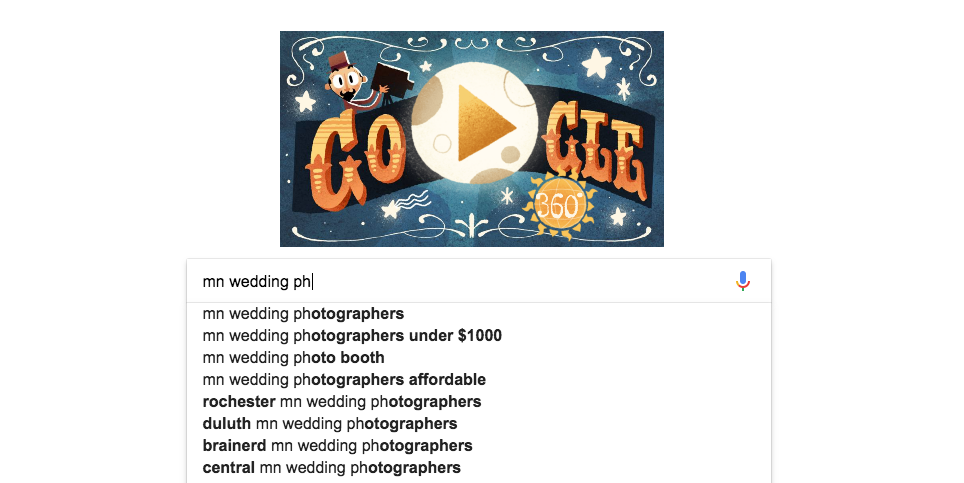Step-by-Step SEO Keyword Research: Tips from a Website Content Writer
May 30, 2018
Everyone and their mother seems to be talking about keywords but NO ONE is telling you how to find them. Does that sound about right?
Maybe keyword research feels daunting and overwhelming, or maybe it makes you feel like you need to get an MBA before you dig in. None of this needs to be true.
SEO is known for being a mysterious industry. This is mostly because it has to do with competition, and the easiest way to reduce your competition is to stay quiet about the optimization tips and tricks you know. But that’s not how I roll.
Today I’m showing you a behind-the-scenes look at how to do basic SEO keyword research for your website.
Everything learned I was from DIY efforts so I’m confident that you can learn in a similar way if you don’t mind a little experimenting. If you’ve been reading my blog for a while, you know it’s my method of choice. *wink*
I’ve also found success through my own DIY efforts. In a relatively short time (about a year or so), I ranked #1 for four of my desired keywords. While this result may not be plausible in all industries (like for attornies and insurance agencies – uffda, sorry!), it’s still incredible to see how a few minor tweaks can help you grow your online presence long term.
I want to help you become best friends with Google because of your SEO.
So let’s dig into a fairly simple four-step approach to keyword research that will help you discover what keywords are worth focusing your attention on.
(Have you read my post on the basics of SEO? If you haven’t, definitely read that first and then come back to this one to put what you’ve learned into action!)
Step One: Brainstorming relevant words and phrases
Let’s use the example of a wedding photographer that is based in Minneapolis. Since I’m from Minnesota, you’ll see a lot of examples based on my location because, well, it just makes sense. You can still use the same advice no matter where you are located or even if you have a primarily online business as I do.
Anyway, back to our wedding photographer. Let’s call her Becky. If Becky is looking to improve her website’s SEO, her energy is best spent trying to figure out what her ideal brides are already searching for.
The first thing she needs to have nailed down is who her ideal client is. This is a good first step for any small business owner. Becky has found that she really loves capturing Millennial couples who are interested in a rustic or farmhouse wedding theme. Traditional chapel weddings aren’t really her thing, so she wants to focus on clients who want outdoor weddings.
We’ll come back to these specific details in a bit but all of this information will be really helpful. For now, we know who her target audience is. From there, she can move on to creating a list of words that are associated with her industry. “Wedding photographer” naturally comes to mind first, but she can keep going with her list.
Becky will probably come up with a list that looks something like this:
- minneapolis wedding photographer
- wedding photographer st paul
- wedding photos mn
- wedding photographers mn
This is a great place to start! As you create your own list, we can move on to the next step.
Step Two: Preliminary SEO keyword research on Google
Now that you have a list of words and phrases that are specific to your industry, location, and audience, we can start doing some preliminary research. Let’s start with Google’s built-in search function since it is a user-friendly place to start.
If Becky is looking to do some basic research on what brides are searching for in her area, she can go to Google and start typing in key phrases to see what auto populates. It will show her some pretty fascinating results.
She first starts with “wedding photographer” and here is what comes up:
After taking a look at this, she can see that “wedding photographers mn” is a strong keyword since it is near the top. She also has it on her original list of ideas so it’s a match.
Now she tries another key phrase from her list. This time, she finds even more interesting results:
Wow! It looks like when people are about to search for “mn wedding photographer”, they are looking for photographers who are affordable and have services under $1000. Becky didn’t have these on her initial list so she’s glad she checked.
If Becky’s pricing is around $1000 or less, she would want to include more of these popular keywords because it’s a great and relevant fit.
However, like many of my own wedding photographer copywriting clients, Becky’s pricing is higher than $1000 because of the value she provides her clients well beyond their wedding day. She won’t want to use these popular keywords with the words “affordable” and “under $1000” because she would attract the wrong brides.
(Side note: Are you starting to see how this all comes together? We haven’t even gotten to the good stuff yet and we already know a lot. Okay, let’s keep going.)
Step Three: Getting more specific with your SEO keywords
Look back at Becky’s initial list of key phrases in Step One. You may be thinking “Wow, they all seem pretty basic.” You’d be right. While these popular phrases are searched for frequently, we’ll want to focus more attention on how to make Becky’s website stand out to her ideal brides.
We can do this by taking her original list of keywords and getting even more specific. This is where the fun part comes in!
Remember how Becky liked shooting weddings that have a rustic or farmhouse look? Many of those types of weddings take place in barn wedding venues. Keeping this in mind, she starts searching for a few different combinations of keywords.
She types in “mn barn wedding photo” but only one option comes up: “barn wedding photography mn”. This tells Becky that she should choose “barn wedding photography mn” over “mn barn wedding photography”.
Even though both options have the same combination of words, the placement of the words is SUPER important. It’s smart to choose the auto-completion keyword because that is what brides are already searching for.
(Pro tip: It would also be smart for Becky to create relationships with barn wedding venues and other wedding vendors who help brides create a shabby chic look. This will help Becky stay in front of brides who already match her style as wedding vendors refer her work and vice versa. You can borrow the same approach for your website.)
Take a moment to create your own list of specific keywords. You can start with the key phrases you wrote originally and break them down into words that describe your process, experience, style, or any other factor that helps you sell what you do.
If you are a designer, you can start playing with keywords that describe your unique style (minimal vs. romantic), a color palette of your choice (neutral vs. neon), or client type (startup vs. agency).
If you are an online course creator in marketing, you can experiment with keywords that describe your teaching style (video course vs. email course) or topic of choice (Instagram photo styling vs. Instagram caption writing).
Spend some time in this phase! You may just stumble upon a list of keywords that connect you with your ideal client sooner than you think.
Step Four: More advanced SEO keyword research
We can learn a lot by looking at Google, but our work isn’t done yet. Let’s get back to Becky. Since she wants to start implementing keywords like “mn wedding photographer” and “barn wedding photography mn” into her website as soon as possible, she decides to look into a more robust keyword research tool.
You can do your own keyword research through the Google Keyword Planner (which is only available for people who run Google ads), Moz Keyword Explorer (10 keywords available each month with a free account – highly recommend!) or even Answer The Public.
There are so many options to choose from so let’s just look at one. I really love the Moz Keyword Explorer so we’ll use that for our example.
As Becky types in “mn wedding photographer” and hits search, she is greeted by numbers and graphs she doesn’t quite understand. If you feel the same way looking at these results, don’t worry! You’re not alone.
Let’s talk about what each piece of jargon actually means in a language we can all understand.
- Volume: Volume refers to how many approximate users on a monthly basis are searching for your desired keyword. Because there is no data here, it means that it is too low for their tool to measure. We can infer that it’s because of the specific location (Minnesota in this case) in the keyword. If we used a more general keyword like “wedding photographer”, we would see the monthly volume dramatically increase. Keep in mind that the higher the volume, the more competition you’ll usually find.
- Difficulty: The keyword difficulty score ranges from one to 100. The higher the number, the more difficult it will be to compete with other service providers who are already ranked for the keyword. Moz recommends that new businesses start with keywords that are at a maximum of 20-30 range for difficulty. As you grow, you can continue to optimize your website for stronger keywords where there is more competition.
- Organic CTR: Click-through-rate (or CTR) shows how likely a keyword is to convert into organic web traffic to your site. The higher the organic CTR, the better chance you have to have someone click on your website if it’s on the first page of Google. It’s 100% here so score! (By the way, organic web traffic is any traffic you don’t have to pay for, which is my favorite kind. *wink*)
After looking at the results from the Moz Keyword Explorer, Becky feels confident in using “mn wedding photographer”. Although the monthly volume numbers didn’t show up because of her location, the difficulty score is around the range she is shooting for and she loves the 100% organic CTR likelihood.
Now it is your turn to try a few of your SEO keywords!







